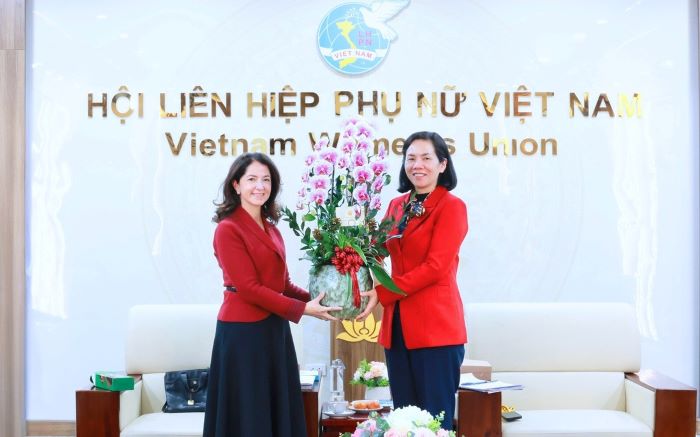Vietnamese female scientists conquer influenza viruses
 Scientists from the Influenza Laboratory under the National Institute of Hygiene and Epidemiology (Ministry of Health) have been honoured with the Kovalevskaya Award 2019.
Scientists from the Influenza Laboratory under the National Institute of Hygiene and Epidemiology (Ministry of Health) have been honoured with the Kovalevskaya Award 2019. "Sweet fruit" after 15 years of dedication
Identifying huge opportunities and challenges in the study of the infectious agents of acute respiratory infections, especially influenza viruses in Vietnam, female scientists from the NIHE’s Influenza Laboratory, headed by Assoc. Prof,. Dr. Le Thi Quynh Mai, succeeded in connecting research achievements in Vietnam and developing scientific theory on topics ranging from the influenza virus to the preparation of vaccines for both seasonal flu and pandemic influenza.
Mai, who is Deputy Director of the NIHE, said that the forerunner of the Influenza Laboratory was the Respiratory Virus Laboratory under the NIHE’s Virology Department which was recognised by the World Health Organisation (WHO) as the National Influenza Centre in March 2000. Tasked with supervising, detecting and studying the viral agents causing acute respiratory infections, the laboratory was the first unit to collect, isolate and identify the causes of a severe acute respiratory infection in Vietnam in March 2003 as a strange virus agent. As a result, it helped control the severe acute respiratory syndrome (SARS) in 2003, thus promoting biosafety practices in Vietnam.
“In 2003, when the SARS epidemic occurred, Vietnam was the first country to notify the WHO of a new disease with atypical pneumonia symptoms, rapid progression and strong transmission with a high mortality rate. Biosecurity concepts and practices were first updated in Vietnam. Risk assessment procedures and biosafety practices in laboratories at varying levels developed by our lab were approved and disseminated by the Ministry of Health throughout the nationwide laboratory system in early 2005,” Mai said.
After this success, a lab was built as a National Standards Centre, a leader in influenza virus research and a member of the Global Influenza Surveillance and Response System (GISRS).
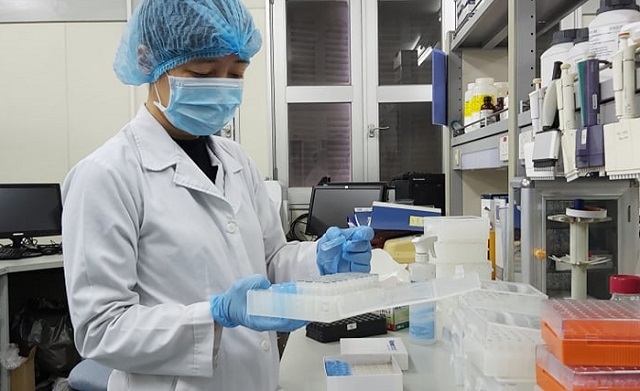
The Influenza Laboratory aims to reduce the burden of disease from seasonal influenza epidemics and the risk from and impact of influenza on public health in Vietnam and other countries around the world.
With lessons learned from the prevention of SARS in 2003, Mai’s team continued their work and identified the first case of avian influenza A/H5N1 virus infection in humans in Vietnam in late December 2003. The results and research materials were shared by the lab with international research institutions. Subsequently, the A/H5N1 influenza virus isolated by the lab was selected by the WHO as a candidate virus strain to develop an A/H5N1 influenza vaccine (A/Vietnam/1194/2004 and A/Vietnam/1203/2004).
To be proactive in epidemic prevention, the team has also participated in creating an A/H5N1 virus strain in the production of influenza vaccines in Vietnam. Mai and her colleagues participated in creating the non-virulent rgA/H5N1 virus strain by reverse genetics, establishing the original and production strains of the A/H5N1 influenza vaccine while meeting the full technical criteria of the WHO. "The research results show that the pandemic influenza A/H1N1/2009 vaccine fully meets all requirements for safety, efficacy and reasonable prices," Mai said.
At present, antiviral medication Oseltamivir-Tamiflu is considered to be the most specific drug in the treatment of influenza A (A/H5N1; H1N1) infections and there are no alternatives or complementary preparations. The later findings spurred the development of a new generation of antiviral drugs and methods of detecting mutations that point to having developed resistance to the influenza A/H5N1 virus.
From 2006-2015, with the support of the US Centre for Disease Control and Prevention (US-CDC) and WHO, the influenza surveillance system has been implemented in 15 locations in four regions across the country, including the North, Central, Central Highlands and South regions. The system provides an overall picture of the prevalence of seasonal influenza viruses in Vietnam with genetic and antigenic characteristics highly similar to those of candidate viruses to make vaccines in the southern hemisphere. The influenza surveillance system then assesses the overall health of the globe and selects the typical influenza virus to produce the vaccine.
Following the success of the influenza vaccine production, the lab’s current studies focus on determining the effect of acquired immune status after the seasonal influenza vaccination on the boosters’ prophylactic potential every year, especially with the influenza A/H3N2 virus.
After 15 years of tireless research efforts, their scientific work on influenza was honoured with the Kovalevskaya Awards 2019. Mai said she and her colleagues at the lab are extremely happy to have received this award, a recognition for their dedicated research efforts over many years.
“Our team has published 207 articles in prestigious national and international scientific journals, including more than 140 international and 66 domestic publications on influenza-related issues. Currently, the lab is a member of the GISRS and we also regularly update our monthly influenza virological data to the WHO’s FluNet network, as well as sharing representative strains of seasonal influenza from Vietnam annually (50 strains a year) with standard influenza research centres to select components for making influenza vaccines,” Mai proudly said.
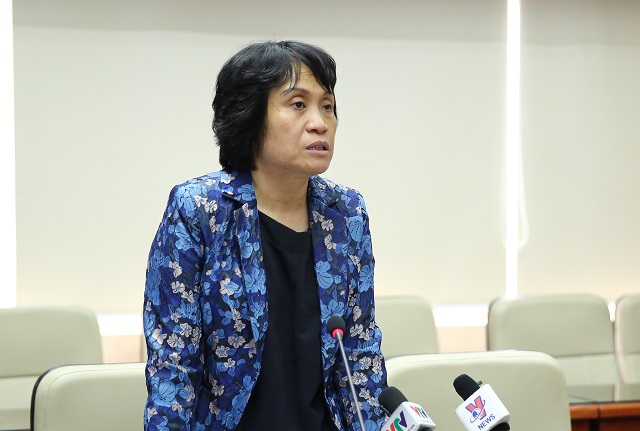
Assoc. Prof., Dr. Le Thi Quynh Mai.
From influenza to SARS-CoV-2: Neither strange nor surprising
The early detection of the SARS-CoV-2 virus and the speed of the next research direction is hardly surprising – it emanates from the confidence gained by the research staff at the NIHE following their previous scientific work on influenza research. In order to make Vietnam become one of the first four countries around the globe that isolated the new strain of coronavirus, NIHE’s female scientists sacrificed a lot as they worked throughout the Lunar New Year (Tet) holiday to achieve the result.
By the end of December 2019, COVID-19 broke out in China and there were deaths. Everyone in the NIHE began to get really worried. On the evening of the 28th day of the last month on the lunar calendar 2019, the NIHE’s laboratory was informed by the National Hospital of Tropical Diseases of the first case detected in Vietnam. The whole lab were determined to work through Tet.
Assoc. Prof., Dr. Nguyen Le Khanh Hang, Deputy Head of the NIHE’s Virology Department, said that the most worrying period was from the 28th day of the last month on the lunar calendar 2019 to the sixth day of the new lunar year because there were no standards on all of the diagnostic, updated information and screening systems yet. On the 6th day of the Lunar New Year (January 30, 2020), when the first three cases of infection were confirmed in the North, all of the scientists there felt really worried.
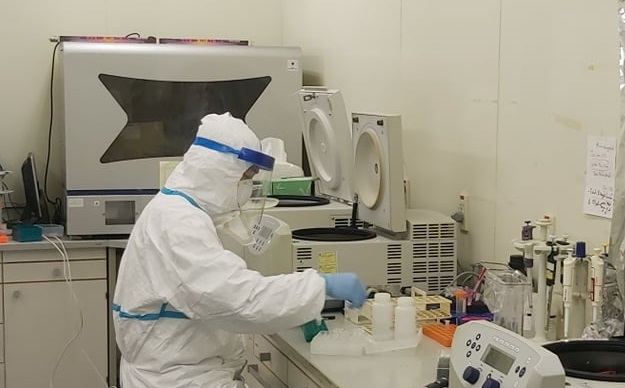
Scientists at the influenza laboratory have isolated SARS-CoV-2, the virus that causes COVID-19. Nearly 20 years ago, recognising the lab's contribution to SARS control, the State President awarded it the 3rd Class Labour Order in 2004 for “outstanding achievements in SARS prevention and control, contributing to the health protection and care of the people”.
From January 30, the number of samples increased dramatically, up to 70-80 samples a day. After zoning the most infected area, in some days, the number increased to nearly 100 a day and were mainly taken from Vinh Phuc Province. The workload quadrupled, while the frequency was higher.
The whole testing process requires many steps, laboratory staff needing to have impeccable levels of accuracy. Machines need rest and staff also need maximum levels of alertness to deliver the most accurate results. Each sample was researched carefully both in terms of epidemiology and symptoms to compare with the testing results to not miss out false negatives. Inaccurate results cause many consequences, while inadequate preservation of patient samples and careless dispersion of the virus could lead to the infection of the testing staff.
According to Assoc. Prof., Dr. Le Thi Quynh Mai, at that time, besides the urgent task of testing to return results in 24 hours, adhering to the specific standards from the WHO, the NIHE must immediately begin the research to isolate of COVID-19 virus.
Mai and 10 of her colleagues from the Influenza Laboratory and the Laboratory of Animal-to-Human Virus embarked on nurturing the virus. Facing this new strain of coronavirus that has left the world struggling, while samples in Vietnam were still limited, the researchers had to overcome the challenge of selecting the appropriate cell line to multiply the coronavirus.
Based on articles published around the world, especially in China, the team had to use many different cell types, and eventually chose the right receptor cell line to isolate. Finally, in a positive isolated sample, the virus invaded the cell. It lived and multiplied in the cell, as well as releasing itself and re-entering another cell. It was a complete virus.
And fortunately, the SARS-CoV virus, which was successfully cultured and isolated by the institute 17 years ago, is still kept at its biosafety room for research purposes.
"We have successfully isolated the COVID-19 virus!" All burst into happiness. After only one week of culture and isolation, the team was confident that they had found the virus that is causing the worldwide epidemic.
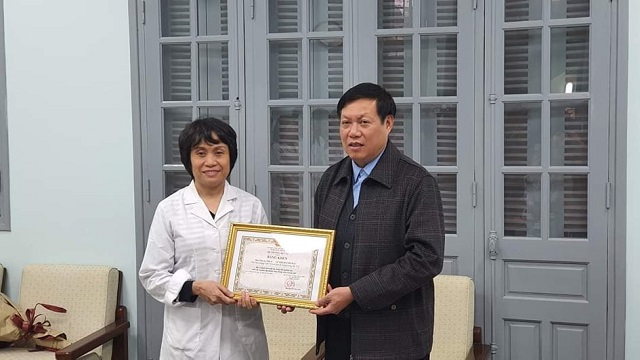
On February 12, 2020, the Ministry of Health awarded its Certificate of Merit to both the collective and six individuals from the National Institute of Hygiene and Epidemiology for outstanding achievements in the research on the culture and isolation of SARS-CoV-2. In this file photo, Deputy Minister of Health Do Xuan Tuyen (R) awards the Certificate of Merit of the Ministry of Health to Assoc. Prof., Dr. Le Thi Quynh Mai for her achievements in the isolation of the novel coronavirus.
Mai said that it is a very important success because the virus isolation will help Vietnam decipher the origin of the new virus, as well as its virulence, pathogenicity, ability to penetrate and immunogenicity. Meanwhile, Deputy Head of the Virology Department Khanh Hang said cheerfully that this result is prerequisite data for researching therapies, developing specific diagnostic products and producing vaccines in the future.
The fact that Vietnam is one of the first four countries that successfully isolated the novel coronavirus facilitates the production of rapid test kits for infected and suspected cases, while improving the ability to test thousands of specimens every day if needed. The success also helps us study the virulence of this virus in Vietnamese people and its infectious characteristics, thereby facilitating treatment and anti-epidemic effectiveness.
These days, the staff from the lab are still traveling to many provinces and cities across the nation to train local health workers on testing and disease control, helping them be able to carry out tests for early detection of the new strain of coronavirus.
Recognising the achievements of the institute's female scientists, Assoc. Prof., Dr. Le Thi Quynh Mai shared, this is a continuation in achievement following the feat of their seniors 20 years ago, when the institute was honoured with the Kovalevskaya Award. With a good scientific environment and support from the institute’s leaders, the female scientists there are able to promote their initiatives and have access to the most updated scientific information in the world. "With such good conditions and environment, it is really embarrassing to not do well," Assoc. Prof., Dr. Quynh Mai said.
At the NIHE, up to 70% of the staff are female and research is relatively hard work for them. However, they have never stepped back because of this hardship. "I hope that the next generation of younger scientists will continue to maintain the institute's scientific research tradition so that more research projects will be recognised by the scientific community, as well as society in general," Mai said.


